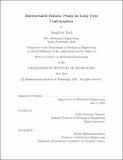Bioresorbable Osmotic Pump for Long–term Contraception
Author(s)
Park, Sanghyun
DownloadThesis PDF (60.07Mb)
Advisor
Traverso, Carlo Giovanni
Terms of use
Metadata
Show full item recordAbstract
Family planning has been a key social issue in most developing countries, especially in Sub-Saharan Africa, yet there are still significant unmet needs for contraception. Among the various commercial contraceptive products, contraceptive implants are regarded as the most effective reversible option due to their high drug adherence. However, the implants currently on the market are mostly limited to non-bioresorbable matrix-diffusion systems. These Fickian diffusion-based systems raise problems like inconstant release rates that compromise their long-term efficacy, the requirement of surgical removal, and a long pharmacokinetic tail that delays the user’s return to fertility. Here, we investigated a fully bioresorbable osmotic pump system that provides over 1.5 years of contraception. Osmotic pump systems are recognized for their capacity to provide near zero-order drug release kinetics coupled with immediate drug release cessation upon completion of osmotic swelling/displacement. In the wet tissue environment, the high osmolality of the osmotic engine causes water flux into the pump through a semi-permeable membrane, and the increased internal pressure from the expansion causes the drug formulation to be pushed out through the orifice on the other side. To our best knowledge, bioresorbable osmotic pump implants have never been introduced. The contraceptive drug Levonorgestrel Drug microcrystals were suspended in a viscous polymer solution to achieve long-term stability. To prevent osmotic engine leakage while allowing sufficient water permeation for expansion, we developed bioresorbable semi-permeable membranes by a non-solvent induced phase separation method with Polycaprolactone (PCL) and achieved acceptable molecular weight cut-off values around 50-100k Da. Hyaluronic acid was selected for the osmotic engine, and our early work confirmed its potential for linear expansion and for overcoming the high hydraulic pressure of the viscous formulation. This fully bioresorbable, zero-order release osmotic pump system has the potential to be an impactful long-term drug delivery platform device for contraception, as well as other diseases that affect the global population where drug adherence is necessary for efficacy.
Date issued
2022-05Department
Massachusetts Institute of Technology. Department of Mechanical EngineeringPublisher
Massachusetts Institute of Technology